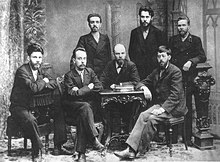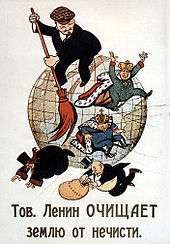Vladimir Ilyich Ulyanov (22 April 1870– 21 January 1924), better known as Lenin, was a Russian revolutionary, politician and political theorist who served as head of government of Soviet Russia from 1917 to 1924 and of the Soviet Union from 1922 to 1924. Under his administration, Russia and then the wider Soviet Union became a one-party communist state governed by the Russian Communist Party. Ideologically a communist, he developed a variant of Marxism known as Leninism. He is widely considered one of the most significant and influential figures of the 20th century.

Lenin (seated centre) with other members of the League of Struggle for the Emancipation of the Working Class (1897)
The 1917 February Revolution ousted the Tsar and established a provisional government, Lenin returned to Russia (having been arrested in 1897 for sedition and subsequently exiled to Shushenskove, he then moved to Western Europe) to play a leading role in the October Revolution, in which the Bolsheviks overthrew the new regime.

Lenin’s Bolshevik government initially shared power with the Left Socialist Revolutionaries, elected soviets and a multi-party Constituent Assembly, although by 1918 it had centralised power in the new Communist Party. Lenin’s administration redistributed land among the peasantry and nationalised banks and large-scale industry.

Join the discussion
0 people are already talking about this, why not let us know what you think?